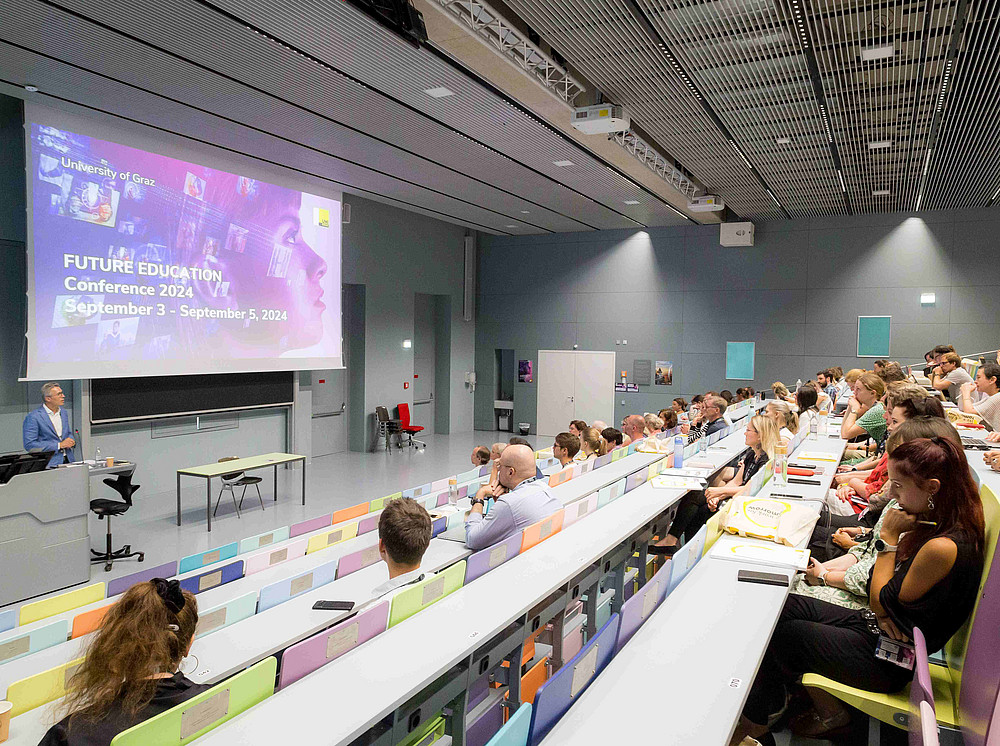Diese interdisziplinäre Konferenz bietet einen inspirierenden Rahmen für die Präsentation und Diskussion aktueller wissenschaftlicher Arbeiten zu den Themen Bildung, Lernen, Entwicklung und Unterricht. Der Fokus der Konferenz liegt dabei auf interdisziplinären Arbeiten, die dazu beitragen, die Bildung der Zukunft so zu gestalten, dass Lernende aktuelle und künftige Herausforderungen gut meistern können. Damit soll ein gesellschaftlicher Diskurs darüber angeregt werden, wie eine erfolgreiche Bildung der Zukunft aussehen kann.
Call for Papers extended: FUTURE EDUCATION Conference 2026
Interdisciplinary Research Perspectives
01.09.2026 - 03.09.2026
Die FEC 2026 lädt Forscher:innen und Praktiker:innen ein, innovative Beiträge aus den Bereichen Bildung, Lernen, Entwicklung und Unterricht einzureichen.
Die interdisziplinäre Konferenz bietet einen inspirierenden Rahmen, um aktuelle wissenschaftliche Arbeiten zu präsentieren, zu diskutieren und gemeinsam neue Wege für die Bildung der Zukunft zu entwickeln. Einreichungen sind bis 22. Februar 2026 ausschließlich auf Englisch möglich - via ConfTool.
Wichtige Termine
- 10. November 2025: Start der Einreichungen
- 22. Februar 2026: Ende der Einreichungsfrist
- 1. April 2026: Start der Anmeldung
- 30. April 2026: Ergebnisse der Reviews werden bekannt gegeben
- 1. Juni 2026: Anmeldeschluss für Vortragende
- 1. Juli 2026: Veröffentlichung des Programms
- 10. August 2026: Anmeldeschluss
- 1.-3. September 2026: FUTURE EDUCATION Conference 2026: Interdisciplinary Research Perspectives
Konferenzbeitrag FEC 2026
- Postdocs und Professor:innen: 145€
- Predocs (PhD-Studierende) und Praktiker:innen: 60€
- Students (Bachelor, Master): 30€
Symposium
Symposien bieten die Möglichkeit, unterschiedliche Forschungsperspektiven zu einem spezifischen Thema aus verschiedenen disziplinären Blickwinkeln zu präsentieren. Jedes Symposium umfasst drei Vortragende, eine:n Chair sowie eine:n Discussant. Für jedes Symposium ist eine 90-minütige Sitzung vorgesehen, mit jeweils 20 Minuten Präsentationszeit pro Vortrag und 10–15 Minuten für den Beitrag des Discussants.
Symposien müssen die Two-Country-Rule erfüllen: Aktive Teilnehmer:innen (präsentierende Autor:innen, Chair und Discussant) müssen aus mindestens zwei verschiedenen Ländern stammen. Alle aktiven Teilnehmer:innen müssen über ein FEC 2026-ConfTool-Konto verfügen.
Forschungsvortrag (Research Lecture)
Eine Research Lecture bietet die Möglichkeit, aktuelle Forschungsergebnisse in einem interdisziplinären Rahmen vorzustellen und zu diskutieren. Für jede Präsentation stehen 20 Minuten zur Verfügung, gefolgt von 10 Minuten Diskussion. Die Vorträge werden thematisch zu 90-minütigen Sessions zusammengefasst, in denen jeweils drei Präsentierende auftreten.
Poster Gallery Walk
Poster bieten Forschenden die Möglichkeit, ihre Arbeiten in unterschiedlichen visuellen Formaten zu präsentieren. Die Postersession findet als 90-minütiger „Gallery Walk“ statt und ermöglicht es den Teilnehmer:innen, in vertiefte Gespräche über die vorgestellten Forschungsarbeiten einzutauchen. Poster werden im A0-Hochformat präsentiert (Maße: 841 mm x 1189 mm).
Keynote-Speaker
Scientific reasoning encompasses students’ ability to use evidence to understand natural phenomena, generate explanations for them, and evaluate claims. It involves forming hypotheses, designing and conducting observations or experiments, analyzing data, drawing conclusions, argumentation, and revising ideas based on empirical evidence. In my talk, I will illustrate how these processes can be enabled and facilitated using educational technology such as virtual experiments (simulations) to engage in (guided) scientific inquiry practices. The reported studies show how educational technology serves to augment (rather than replace) hands-on experiments; moreover, they illustrate effective ways to support cognitive and metacognitive processes during scientific inquiry.
Learning to read depends on children’s phonological skills and letter knowledge, and measures of rapid naming skill are also correlates of reading fluency. Drawing on a longitudinal study of children at high risk of reading disorders, it is proposed that oral language is the foundation of reading yet its role has typically been underplayed in models of reading development. Data are presented highlighting both the direct and indirect impact of language skills beyond phonology on children’s reading outcomes. Findings are discussed within a multifactorial framework and implications for interventions to promote reading and related educational skills are considered.
Over the past two decades, research on games and learning has revealed how well-designed play can foster cognitive development, motivation, and behavioral change across education, health, and even justice systems. Yet as the world faces escalating disinformation, polarization, and social fragmentation, the field must evolve. This talk reflects on what we have learned about how games cultivate thinking and skill - and argues that the next frontier lies in designing for shared understanding, critical discernment, and civic imagination. Games for learning must now help rebuild the very social fabric that enables learning, trust, and democracy itself.
Talent development frameworks have typically been associated with serving the most able learners in schools. However, to effectively engage in talent development requires gaining an understanding of learners’ current skills and competencies and helping them to move to the next level. As we work towards making society more inclusive, an equitable talent development framework requires recognizing and embracing the backgrounds of all students and creating educational environments where they all thrive. In this presentation, I will discuss psychological factors that showcase how to personalize learning experiences by addressing the unique cultural, social, and cognitive influences that shape each student’s educational journey.
Margaret Snowling - University of Oxford, GB: “Language, Literacy and Learning to Read”
